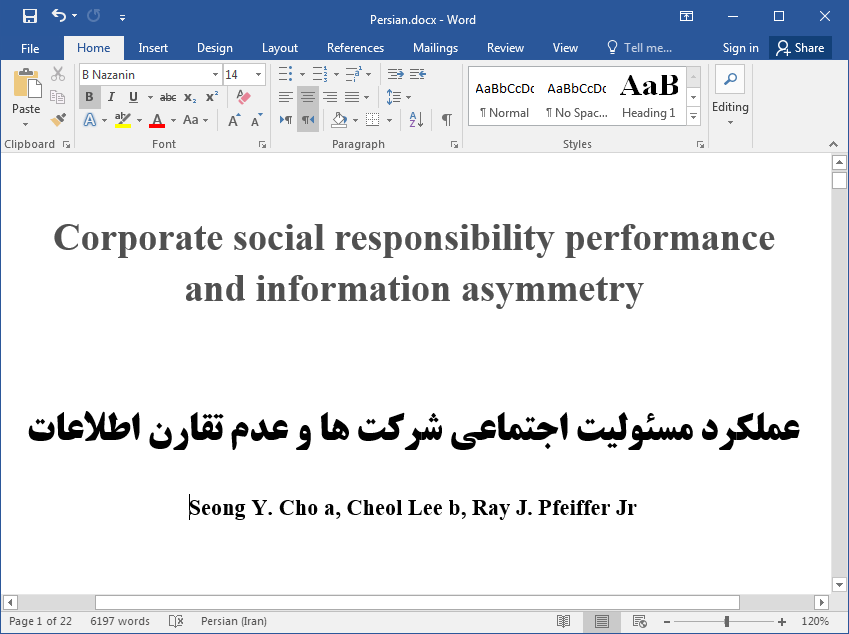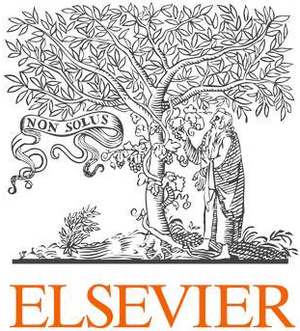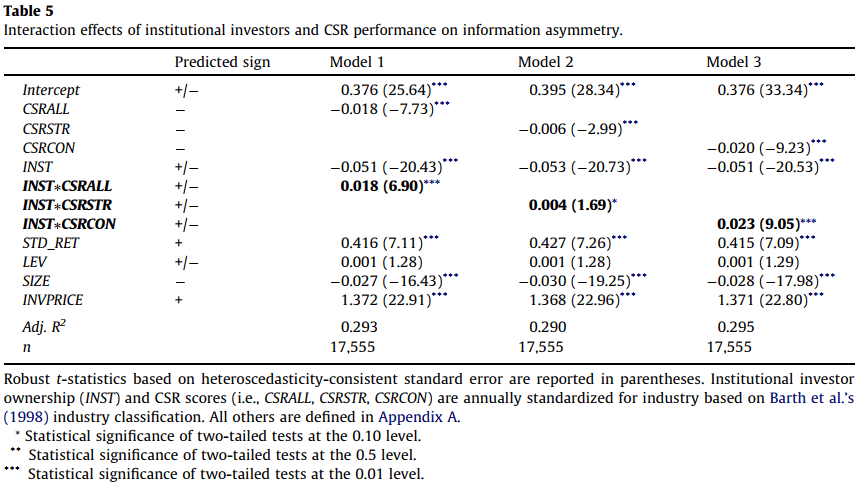کارایی مسئولیت اجتماعی شرکتی (CSR) و عدم تقارن اطلاعات


24,500 تومانشناسه فایل: 8178
- حجم فایل ورد: 153.1KB حجم پیدیاف: 170.9KB
- فرمت: فایل Word قابل ویرایش و پرینت (DOCx)
- تعداد صفحات فارسی: 22 انگلیسی: 13
- دانشگاه:
- Department of Accounting and Finance, School of Business and Administration, Oakland University, Rochester, MI, United States
- Department of Accounting, School of Business Administration, Wayne State University, Detroit, MI, United States
- Department of Accounting, Neeley School of Business, Texas Christian University, Fort Worth, Texas, United States
- ژورنال: Journal of Accounting and Public Policy (3)
چکیده
با استفاده از نمرات عملکرد مسئولیت اجتماعی شرکتی (CSR) از KLD STAT، ما بررسی می کنیم که آیا عملکرد CSR بر عدم تقارن اطلاعات تاثیر می گذارد. ما دریافتیم که هر دو عملکرد مثبت و منفی CSR باعث کاهش نامتقارن اطلاعات می شود. علاوه بر این، می بینیم که تاثیر عملکرد منفی CSR در کاهش عدم تقارن اطلاعات قوی تر از عملکرد مثبت CSR است. ما همچنین تاثیر سرمایه گذاران آگاه را روی رابطه بین عدم تقارن و عملکرد CSR بررسی می کنیم. ما یافتیم که ارتباط منفی میان عملکرد CSR و وسعت اختلاف بین قیمت پیشنهادی خریدار و قیمت گذاری فروشنده ، برای شرکت های با سطح بالایی از سرمایه گذاران نهادی نسبت به شرکت های با سطح پایین از سرمایه گذاران نهادی کاهش می یابد. این یافته نشان می دهد که سرمایه گذاران آگاه ممکن است از فواید اطلاعات CSR خود بهره برداری کنند. به طور کلی، نتایج ما نشان می دهد که عملکرد CSR نقش مثبتی برای سرمایه گذاران با کاهش عدم تقارن اطلاعات دارد و اقدام نظارتی و قانونی ممکن است برای کاهش مشکل انتخاب معکوس که سرمایه گذاران کمتر آگاه با آن مواجه می شوند، مناسب باشد.
مقدمه مقاله
مسئولیت اجتماعی شرکتی (CSR) به نظر می رسد که منافعی برای قانونگذاران ، دانشگاهیان و فعالان بازار به همراه دارد. اطلاعات عملکرد CSR مخصوصا برای سرمایه گذاران مهم است. برای مثال مدیران حرفه ای در آمریکا تقریبا 3.1 تریلیون دلار سرمایه را به عنوان اوراق بهادار سرمایه گذاری با مسئولیت اجتماعی (SRI) در سال 2010 در نظر گرفتند. این موضوع بیان می کند که عملکرد CSR تاثیر مستقیمی بر روی ثروت سرمایه گذاران دارند (جلسه سرمایه گذاری اجتماعی 2010). علاوه بر این، مطالعات اخیر بیان می کند که سرمایه گذاران به دنبال اطلاعات قابل اطمینان برای عملکرد CSR از طریق کانال های عمومی و خصوصی هستند و آن ها از این اطلاعات در تصمیمات سرمایه گذاری خود مشخصا استفاده می نمایند. (e.g., CICA, 2010; Cohen et al., 2011; Cruise, 2011)
علیرغم اهمیت فزاینده اطلاعات در خصوص عملکرد CSR یک شرکت برای سرمایه گذاران ، شواهد دال بر نقش آن در برآوردهای سرمایه گذاران از ارزش شرکت بسیار اندک است. به خصوص، شواهد اندکی وجود دارد که آیا اطلاعات درباره عملکرد CSR که از طریق نهاد های شخص ثالث انتقال می یابد، فوایدی برای سرمایه گذاران با کاهش عدم قطعیت فراهم می نماید. اگر عملکرد CSR مرتبط با تصمیمات سرمایه گذاران باشد ، آیا عملکرد مثبت و منفی CSR به طور مساوی دارای تاثیر می باشند؟ علاوه بر این ، دانسته های کمی درباره نقش های متفاوت و محتمل سرمایه گذاری با آگاهی بیشتر یا کمتر در متن عملکرد CSR وجود دارد. پاسخگویی به این سوالات مهم می باشد زیرا درک ما از اینکه چگونه عملکرد CSR، فرآیند های تخصیص سرمایه از سوی سرمایه گذاران را متاثر می سازد، را تقویت می نماید و احتمالا بینش های مفیدی با توجه به مفاهیم سیاست برای قانونگذاران فراهم می آورد.
در این مقاله، ما ارتباط ناشناخته میان اطلاعات در خصوص عملکرد CSR و عدم تقارن اطلاعات در بازار بورس را آشکار می نماییم. به طور تخصصی به دو سوال پژوهشی می پردازیم: (1) چگونه عملکرد CSR بر عدم تقارن اطلاعات تاثیر می گذارد و (2) آیا رابطه میان عملکرد CSR و عدم تقارن اطلاعات برای شرکت های با سرمایه گذاران آگاه تر فرق می کند؟
ما از چندین مطالعه پیشین در خصوص پاسخگویی به این سوالات استفاده نمودیم. با توجه به سوال پژوهشی اول ، عملکرد CSR، افشا CSR داوطلبانه شرکت ها را تشویق می کند (e.g., Clarkson et al., 2008; Dhaliwal et al., 2011; Lyon and Maxwell, 2011) و سبب کسب کیفیت می گردد (Kim et al., 2012). علاوه بر این، افشاء شخص ثالث اطلاعات جدیدی فراتر از آنچه توسط افشاء CSR داوطلبانه شرکت ها انتقال می یابد ، مهیا می سازد (Shane and Spicer, 1983) این گونه افشاء ها و کسب کیفیت بهبود یافته، شفافیت شرکت ها را افزایش می دهد که به نوبه خود بایستی عدم تقارن اطلاعات را کاهش دهد (e.g., Diamond and Verrecchia, 1991; Lambert et al., 2007).
سوال پژوهشی دوم ما ادبیات گذشته در خصوص عدم تقارن اطلاعات میان سرمایه گذاران آگاه (سرمایه گذاران نهادی) و سرمایه گذاران کمتر آگاه (سرمایه گذاران خرده فروش) با توجه به عملکرد CSR (e.g., CICA, 2010; Cohen et al., 2011) و تاثیر سرمایه گذاران آگاه روی عدم تقارن اطلاعات را (e.g., Grossman and Stiglitz, 1980; Copeland and Galai, 1983; Glosten and Milgrom, 1985; Kyle, 1985; Easley and O’Hara,1987; Merton, 1987; Schwartz and Shapiro, 1992) را توسعه و بسط می دهد. به خصوص حضور سرمایه گذاران آگاه می تواند کارایی که با آن اطلاعات در قیمت های بازار منعکس داده می شود را افزایش دهد. در هر صورت ، در چندین مورد حضور سرمایه گذاران آگاه می تواند عدم تقارن اطلاعات را بسته به اینکه چگونه سرمایه گذاران آگاه انجام تجارت خود را انتخاب کنند ، افزایش می دهد. لذا ما تاثیر حضور سرمایه گذاران با آگاهی های متفاوت را با توجه به عملکرد CSR روی میزان عدم تقارن اطلاعات بررسی می نماییم.
جهت بررسی سوالات پژوهش خود ، ما از نمرات عملکرد CSR از KLD STAT به عنوان نماینده هایی برای عملکرد CSR شرکت استفاده نمودیم. برعکس تلاش های معمول در مطالعات پیشین (e.g., Waddock and Graves, 1997; McWilliams and Siegel, 2000; Kim et al., 2012)، ما فهرست های عملکرد CSR را به شاخص های مثبت (نقاط قوت) و منفی ( نگرانی ها) تجزیه می کنیم و برای سال و تاثیرات صنعت تنظیم می نماییم. این رویکرد ما را قادر می سازد تا از از دست دادن اطلاعات مفید درباره عملکرد CSR در متن عدم تقارن اطلاعات جلوگیری نماییم زیرا هر دو نمرات عملکرد مثبت و منفی CSR می تواند برای تصمیمات سرمایه گذاری پر محتوا باشد. برای مثال ، سرمایه گذاران می توانند یک نمره عملکرد CSR مثبت را (برای مثال بهبود تلاش های محیطی یا تقویت روابط مشتری) به عنوان علامت پیمایش بهتر و تدارک منابع بوسیله هیئت شرکت ، تعریف نمایند. به طور مشابه یک نمره عملکرد منفی CSR که ناشی از پرداخت جریمه ها یا درگیر بودن در فعالیت های مباحثه ای اجتماعی است ، سرمایه گذاران را از تغییرات محتمل در سودآوری شرکت یا خطر به علت عدم مدیریت صحیح مربوط به CSR آگاه می سازد.
شواهد ما نشان می دهد که هر دو شاخص های مثبت و منفی عملکرد CSR به کاهش عدم تقارن اطلاعات کمک می نماید. یک یافته منحصرا جالب این است که تاثیر عملکرد منفی CSR بسیار قوی تر از عملکرد مثبت CSR در کاهش عدم تقارن اطلاعات است.
با توجه به سوال پژوهشی دوم ، ما می یابیم که عدم تقارن مرتبط با عملکرد CSR برای شرکت های با مالکیت سازمانی (نهادی) بالاتر نسبتا بیشتر می باشد. سازگار با مدل های تحلیلی (e.g., Glosten and Milgrom, 1985; Kyle, 1985; Kim and Verrecchia, 1994, 1997; Fisher and Verrecchia, 1999) ما این یافته را به عنوان بیان کننده این که تاثیرات انتخاب معکوس برای سرمایه گذاران آگاه (Kyle, 1985; Glosten and Milgrom, 1985) قوی تر از تاثیرات کارایی اطلاعات (Merton, 1987; Akins et al., 2012) با توجه به عملکرد CSR است، تعریف می کنیم.
خلاصه ، یافته های ما پیشنهاد می کند که : (1) سرمایه گذاران نظرات واگرایی درباره مفاهیم عملکرد CSR دارند (2) سرمایه گذاران نهادی دارای توانایی متفاوتی در پردازش اطلاعات می باشند و همچنین دسترسی برتر به اطلاعات عملکرد CSR با کیفیت بالا و به موقع (3) این تفاوت ها در میان سرمایه گذاران به طور نامطلوبی عدم تقارن اطلاعات را متاثر می سازد(Beaver, 2002; Bushee and Goodman, 2007).
ما معتقدیم که مطالعه ما چندین کمک می نماید. اولا ، یافته های ما ارتباط ناشناخته میان عملکرد CSR و عدم تقارن اطلاعات را بررسی می نماید. نتایج ما بیان می کند که عملکرد CSR عموما فوایدی برای سرمایه گذاران با کاهش عدم تقارن اطلاعات در بازار برابری، فراهم می سازد. مطالعه ما همچنین اهمیت در نظر گرفتن عملکرد مثبت و منفی CSR را هنگام برآورد تاثیرات اطلاعات مربوط به CSR آشکار می سازد. علاوه بر این ، ما بینشی در وجود و تاثیرات تعریف واگرا از عملکرد CSR در میان سرمایه گذاران آگاه و ناآگاه فراهم می نماییم.
یک مفهوم سیاست یافته های ما این است که تاثیر معکوس و آشکار سرمایه گذاران با آگاهی های متفاوت با توجه به عملکرد CSR مشخص می نماید که ممکن است فواید محتملی برای توسعه بیشتر منبع اطلاعات عملکرد CSR که به طور عموم در دسترس است و افشاء بیشتر CSR استاندارد شده ، وجود داشته باشد.
ABSTRACT Corporate social responsibility performance and information asymmetry
Using Corporate Social Responsibility (CSR) performance scores from KLD STAT, we investigate whether CSR performance affects information asymmetry. We find that both positive and negative CSR performance reduce information asymmetry. Moreover, we find that the influence of negative CSR performance is much stronger than that of positive CSR performance in reducing information asymmetry. We also investigate the effect of informed investors on the CSR performance-asymmetry relation. We find that the negative association between CSR performance and bid-ask spread decreases for firms with a high level of institutional investors compared to those with a low level of institutional investors. This finding suggests that informed investors may exploit their CSR information advantage. Overall, our results suggest that CSR performance plays a positive role for investors by reducing information asymmetry and that regulatory action may be appropriate to mitigate the adverse selection problem faced by less-informed investors.
Introduction
Corporate Social Responsibility (‘‘CSR’’) appears to be gaining interest among regulators, academics, and market participants. Information about CSR performance is particularly important to investors. For example, professional managers in the US hold about $3.1 trillion assets identified as socially responsible investment (SRI) portfolios as of 2010, suggesting that CSR performance has a direct impact on investors’ wealth (Social Investment Forum, 2010). In addition, recent studies indicate that investors seek reliable information about CSR performance through public and/or private channels, and they actively utilize the information in their investment decisions (e.g., CICA, 2010; Cohen et al., 2011; Cruise, 2011).
Despite the growing importance of information regarding firms’ CSR performance to investors, evidence on its role in investors’ assessments of firm value is scant. In particular, there is little evidence on whether information about CSR performance conveyed through third-party entities provides benefits to investors by reducing uncertainty. If CSR performance is relevant to investors’ decisions, are positive and negative CSR performance equally impactful? Furthermore, little is known about the potential different roles of more-informed and less-informed investors in the context of CSR performance. Addressing these questions is important because it enhances our understanding of how CSR performance affects investors’ asset allocation processes and provides potentially useful insights regarding policy implications to regulators.
In this study, we shed light on the unexplored link between information about CSR performance and information asymmetry in the stock market. Specifically, we address two research questions: (1) How does CSR performance affect information asymmetry? and (2) Does the relation between CSR performance and information asymmetry differ for firms with more informed investors?1
We build upon several prior studies in addressing these questions. With respect to the first research question, CSR performance motivates firms’ voluntary CSR disclosure (e.g., Clarkson et al., 2008; Dhaliwal et al., 2011; Lyon and Maxwell, 2011) and earnings quality (Kim et al., 2012). Further, third party disclosure provides new information beyond that conveyed by firms’ voluntary CSR disclosures (Shane and Spicer, 1983). Such disclosures and/or improved earnings quality increase firms’ transparency, which, in turn, should reduce information asymmetry (e.g., Diamond and Verrecchia, 1991; Lambert et al., 2007).
Our second research question extends the prior literature on the information asymmetry between informed investors (institutional investors) and less-informed investors (retail investors) regarding CSR performance (e.g., CICA, 2010; Cohen et al., 2011) and the influence of informed investors on information asymmetry (e.g., Grossman and Stiglitz, 1980; Copeland and Galai, 1983; Glosten and Milgrom, 1985; Kyle, 1985; Easley and O’Hara,1987; Merton, 1987; Schwartz and Shapiro, 1992). In particular, the presence of informed investors can increase the efficiency with which information is reflected in market prices. However, in some instances the presence of informed investors can increase information asymmetry, depending upon how informed investors elect to execute their trading. Thus we investigate the effect of the presence of differentially-informed investors with respect to CSR performance on the extent of information asymmetry.
To investigate our research questions, we use CSR performance scores from KLD STAT as proxies for firms’ CSR performance. In contrast to common practice in prior studies (e.g., Waddock and Graves, 1997; McWilliams and Siegel, 2000; Kim et al., 2012), we decompose the CSR performance indices into positive (i.e., strengths) and negative (i.e., concerns) indicators and adjust for year and industry effects.2 This approach enables us to avoid losing useful information about CSR performance in the context of information asymmetry because both positive and negative CSR performance scores can be informative for investment decisions. For instance, investors can interpret a positive CSR performance score (e.g., improving environmental efforts or strengthening customer relationships) as a signal of better monitoring and resource provision by corporate boards. Similarly, a negative CSR performance score resulting from paying fines or engaging in socially controversial activities informs investors of potential changes in firms’ profitability or risk owing to CSR-related mismanagement.
Our evidence shows that both positive and negative indicators of CSR performance contribute to reducing information asymmetry. A particularly interesting finding is that the influence of negative CSR performance is much stronger than that of positive CSR performance in reducing information asymmetry.
Regarding our second research question, we find that asymmetry related to CSR performance is relatively higher for firms with higher institutional ownership. Consistent with analytical models (e.g., Glosten and Milgrom, 1985; Kyle, 1985; Kim and Verrecchia, 1994, 1997; Fisher and Verrecchia, 1999), we interpret this result as indicating that the adverse selection effects of informed investors (Kyle, 1985; Glosten and Milgrom, 1985) are stronger than the information efficiency effects (Merton, 1987; Akins et al., 2012) with respect to CSR performance.
In sum, our findings suggest that: (1) investors have divergent opinions about the implications of CSR performance; (2) institutional investors have differential information processing ability as well as superior access to timely and high-quality CSR performance information; and (3) these differences among investors adversely affect information asymmetry (Beaver, 2002; Bushee and Goodman, 2007).
We believe that our study makes several contributions. First, our findings address the unexplored link between CSR performance and information asymmetry. Our results indicate that CSR performance generally provides benefits to investors by reducing information asymmetry in the equity market. Our study also sheds light on the importance of separately considering both positive and negative CSR performance when assessing the effects of CSR-related information. Furthermore, we provide insight into the existence and effects of divergent interpretation of CSR performance among informed and uninformed investors.
One policy implication of our findings is that the apparent adverse effect of differentially-informed investors with respect to CSR performance suggests that there may be potential benefits to further development of a publicly-available CSR performance information source and more standardized CSR disclosures.


- مقاله درمورد کارایی مسئولیت اجتماعی شرکتی (CSR) و عدم تقارن اطلاعات
- اثرات متقابل سرمایه گذاران نهادی و عملکرد CSR بر عدم تقارن اطلاعات
- عملکرد مسئولیت اجتماعی شرکت و عدم تقارن اطلاعات
- پروژه دانشجویی کارایی مسئولیت اجتماعی شرکتی (CSR) و عدم تقارن اطلاعات
- کارایی CSR و عدم تقارن اطلاعات
- پایان نامه در مورد کارایی مسئولیت اجتماعی شرکتی (CSR) و عدم تقارن اطلاعات
- تحقیق درباره کارایی مسئولیت اجتماعی شرکتی (CSR) و عدم تقارن اطلاعات
- مقاله دانشجویی کارایی مسئولیت اجتماعی شرکتی (CSR) و عدم تقارن اطلاعات
- کارایی مسئولیت اجتماعی شرکتی (CSR) و عدم تقارن اطلاعات در قالب پاياننامه
- پروپوزال در مورد کارایی مسئولیت اجتماعی شرکتی (CSR) و عدم تقارن اطلاعات
- گزارش سمینار در مورد کارایی مسئولیت اجتماعی شرکتی (CSR) و عدم تقارن اطلاعات
- گزارش کارورزی درباره کارایی مسئولیت اجتماعی شرکتی (CSR) و عدم تقارن اطلاعات
